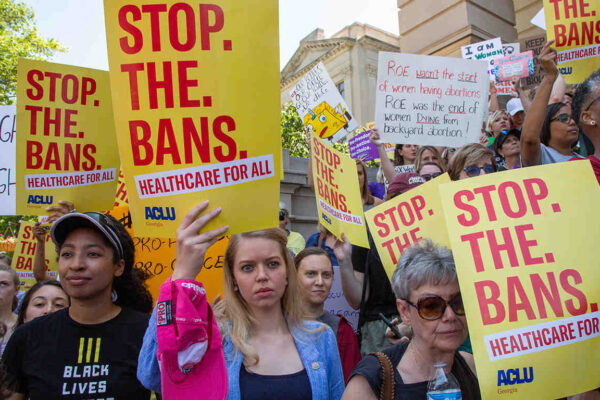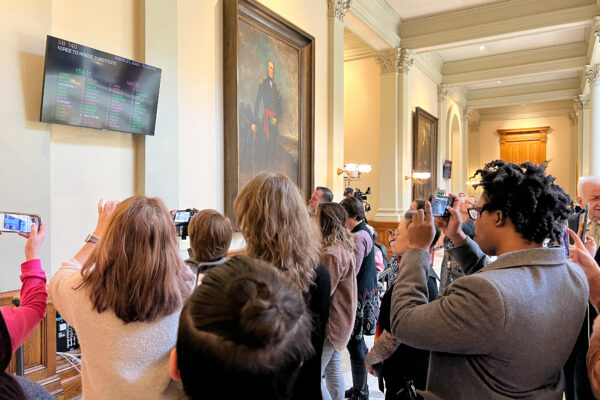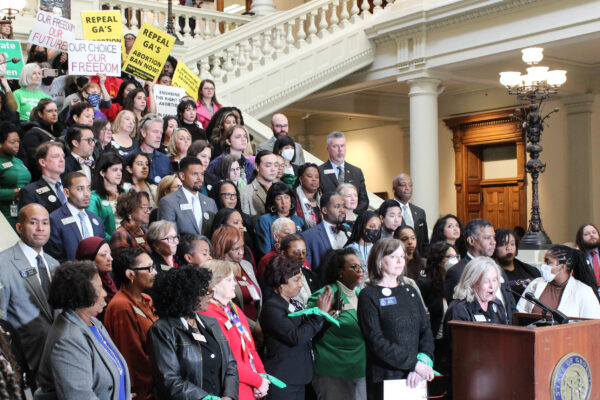ATLANTA — The Georgia Supreme Court issued a ruling today that allows H.B. 481, a ban on abortion after approximately six weeks of pregnancy, to remain in effect. The court’s majority opinion disregards long-standing precedent that a law violating either the state or federal Constitution at the time of its enactment is void from the start under the Georgia Constitution. Georgia’s ban was blatantly unconstitutional when enacted in 2019 against the backdrop of Roe v. Wade and almost five decades of federal precedent, and therefore unenforceable, as the trial court found. But today’s ruling reversing the lower court’s decision concludes that the U.S. Supreme Court’s decision overturning Roe last year effectively erased that history.
The case will now return to the trial court, which has not yet ruled on the remaining claims brought by the plaintiffs — a coalition of physicians, reproductive health centers, and reproductive justice advocates — that the ban violates Georgians’ rights to privacy and equal protection under the state Constitution.
Statement from Monica Simpson, executive director, SisterSong Women of Color Reproductive Justice Collective:
“Today’s devastating decision means that our people will continue to face the horrible reality that they are in today where Georgians are suffering because they cannot access abortion care. This abortion ban has forced Georgians to travel across state lines at great expense or continue the life-altering consequences of pregnancy and childbirth against their wills. In a state that already has OB/GYN deserts, one of the highest maternal mortality rates, especially for us as Black women, and cruel anti-trans legislation, this decision only further disregards us, our bodily autonomy, and our lives. We have been resisting this ban that is steeped in white supremacy for years with our partners, and we are not backing down now. We will continue to work to realize our vision for Reproductive Justice, in which everyone has the right to decide whether or not to have children and raise their children in safe, sustainable communities.”
Statement from Kwajelyn Jackson, executive director of Feminist Women’s Health Center:
“It is heart-wrenching that we are being forced to turn patients away who need abortion care beyond the earliest weeks of pregnancy. We have been continuing to get calls from patients across Georgia and the Southeast who have nowhere in their own communities to turn to for care. Abortion is an essential component of reproductive health care, and this law is putting people’s lives at risk. We will continue to fight this ban on behalf of our patients and our communities.”
Statement from Julia Kaye, senior staff attorney with the ACLU Reproductive Freedom Project:
“For more than a year, Gov. Kemp’s abortion ban has pushed essential care out of reach for countless Georgians, condemning them to costly out-of-state travel in search of basic health care or the nightmare of forced pregnancy and childbirth. The impacts have been devastating, particularly in a state with a growing shortage of OB-GYNs and a severe maternal mortality crisis that weighs heaviest on Black women. While today’s decision is disappointing, this case is far from over. A law that forces the immense pains, risks, and life-altering consequences of pregnancy on Georgians against their will is a clear violation of Georgians’ state constitutional rights, and we’ll keep doing everything in our power to block this cruel law for good.”
Statement from Andrea Young, executive director, ACLU of Georgia:
“Today’s ruling is not the end of this fight for women’s healthcare. Be clear, the right to abortion is on the ballot in 2024. Gov. Brian Kemp and the Georgia legislature acted to take away our rights. The Georgia legislature can restore our rights and we must organize to elect a pro-choice legislature.”
Statement from Carol McDonald, president and CEO of Planned Parenthood Southeast Advocates:
“Planned Parenthood Southeast’s health centers remain open, and we will continue to provide abortion care in Georgia under the severe restrictions of this law — but we know that’s not enough. Make no mistake: Today’s decision will cause irreparable harm to the people of Georgia, the majority of whom want abortion to be legal. At the ballot box in 2024 and beyond, Planned Parenthood Southeast Advocates intends to make sure that Gov. Kemp, AG Carr and their anti-abortion allies in the legislature answer for the public health crisis they’ve created across our state, which has forced so many to remain pregnant against their will or flee their communities for basic health care. We and our partners will keep fighting for Georgians’ ability to control their own bodies, lives, and futures — no matter what.”
Statement from Alexis McGill Johnson, president and CEO of Planned Parenthood Action Fund:
“This is a tragic day for reproductive freedom and for patients in Georgia. Across the southeast, abortion bans have decimated access to care and made pregnancy more dangerous. People seeking abortion beyond the earliest stages of pregnancy will continue to have their lives upended by the cruelty of this law and the out-of-touch politicians that passed it. We cannot and will not stand idly by — Georgians deserve better. We will continue this fight until everyone who needs abortion care can access it, free from political interference and needless hurdles.”
Statement from Alice Wang, staff attorney at the Center for Reproductive Rights:
“For over a year, Georgians have been denied the freedom to chart their own lives and futures. It is outrageous that the Georgia Supreme Court is allowing these harms to continue in clear violation of the state constitution. Every day, people are suffering under these extreme abortion bans imposed by lawmakers who know nothing about healthcare and the realities of pregnancy. But we refuse to back down—we will keep fighting to protect Georgians’ fundamental rights.”
The state court challenge — filed on July 26, 2022, just days after a federal appeals court allowed Georgia’s six-week ban to take effect for the first time since it was signed into law by Gov. Brian Kemp in 2019 — asserts that (1) the Georgia Constitution’s especially strong protection for the fundamental right to privacy prohibits political interference with an individual’s deeply personal and medically consequential decision whether to continue or terminate a pregnancy; and (2) Georgia’s six-week ban was void from the start under the Georgia Constitution because it clearly violated federal constitutional precedent when enacted in 2019.
The trial court granted abortion providers' and advocates’ request to block the law on November 15, 2022, ruling that Georgia’s abortion ban was void from the start, but not yet addressing the other state constitutional claims. One week later, the Georgia Supreme Court stayed the trial court order and let the ban take effect. In March 2023, the Court heard oral arguments on the state’s appeal of the lower court’s ruling that the ban was void from inception.
This case was filed by the American Civil Liberties Union, the ACLU of Georgia, the Center for Reproductive Rights, Planned Parenthood Federation of America, and Georgia-based law firms Caplan Cobb and Bondurant Mixson & Elmore on behalf of SisterSong Women of Color Reproductive Justice Collective, Feminist Women’s Health Center, Planned Parenthood Southeast, Inc., Atlanta Comprehensive Wellness Clinic, Atlanta Women’s Medical Center, FemHealth USA d/b/a carafem, Summit Medical Associates, P.C., Carrie Cwiak, M.D., M.P.H., Lisa Haddad, M.D., M.S., M.P.H., Eva Lathrop, M.D., M.P.H., and Medical Students for Choice.
A copy of this release can be found online here.
A copy of the ruling can be found here.
An overview of the case can be found here.
Related Content

Reflecting on the Impact of Dobbs Ruling a Year Later

Today at the Capitol: Despite strong opposition, Ga. Senate passes Senate Bill 140
Stay Informed
Sign up to be the first to hear about how to take action.
By completing this form, I agree to receive occasional emails per the terms of the ACLU’s privacy statement.
By completing this form, I agree to receive occasional emails per the terms of the ACLU’s privacy statement.

